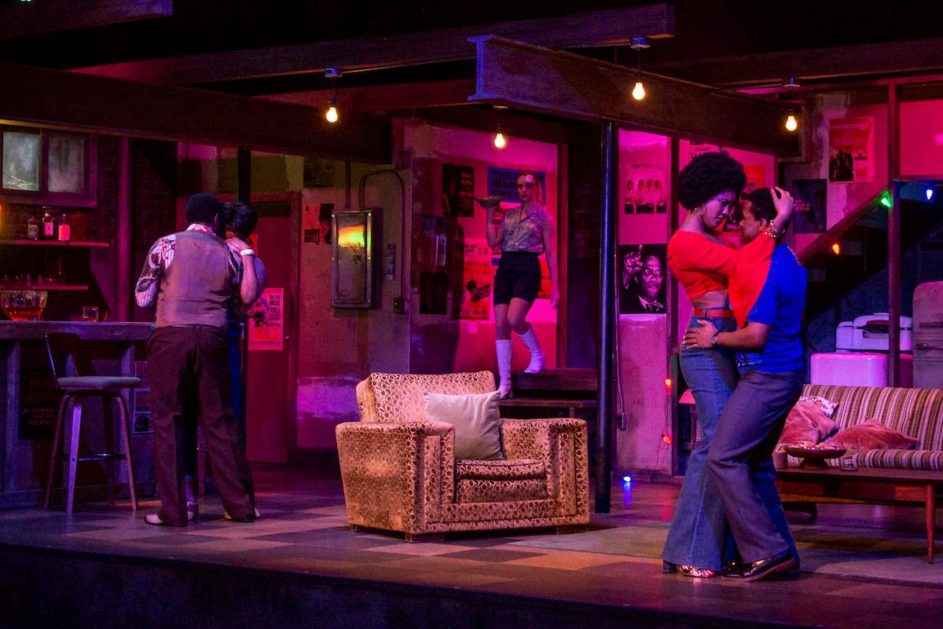Chelle Poindexter (Dee Dee Batteast) and her younger brother, Lank (Gerrard James), are adults still living in their family home. When their parents die, it turns their world upside down. But that’s only the beginning of change as their city goes through the upheaval of the 12th Street riots during the long, hot last week of July in Dominique Morisseau’s “Detroit ’67,” now playing at UT’s Carousel Theatre.
Chelle and Lank see opportunity. Their house is just four blocks from the bars on 12th Street. If they play the right music and have enough liquor flowing, they can make some money by turning their basement into an underground club (which set designer Katie Stepanek gives the feel of reality).
But white Detroit “pigs” are cracking down on late-night unlicensed clubs in black neighborhoods. Supposedly, it’s because the owners aren’t paying taxes. But the police want some of that money for themselves, and they don’t mind being brutal in getting it.

Chelle (Dee Dee Batteast) and Bunny (Aleah Vassell) talk in the Poindexters’ basement bar and music club.
While Lank and his friend Sly (Jade Arnold) are out buying booze and records, family friend Bunny (Aleah Vassell) shows up, dressed in a sizzling red jumpsuit. Bunny could cause a riot by herself.
Lank has eyes for Bunny, and Sly has long wanted to get next to Chelle, even though she’s not interested. Her focus is on her son, away at college. She hopes to use the money from her inheritance to help keep him there.
The cast is ideally tuned to the Motown record-breaking and barrier-breaking era. The dialogue crackles from Bunny’s hot entrance until the lights go out at the end of the show.
The play speaks to the survival of black people (whom everyone in the play calls the “n” word) in Detroit during the upheaval of white flight and the hostilities of white suppression. It’s also an unspoken commentary about how some segments of the largely white police community in too many places still treat black people.
On one of their forays to see what’s happening, Lank and Sly encounter Caroline (Brittany Marie Pirozzoli), a white woman, beaten to a pulp. With no other place to take her without raising suspicions about themselves, they bring her home.
The dynamics change. Caroline is a short-term asset but a long-term liability. She is the girlfriend of one of the rough cops and knows too much for either her or her new friends to be safe, or to follow through on the attraction she and Lank develop for each other.
The success of their basement club leads Lank and Sly to believe they could do better by buying a legitimate club, even risking Lank’s inheritance. But the riots break out, and without paperwork to prove their ownership, police see them as looters.
Things go very wrong.
Batteast and Arnold, who are professional actors, and Vassell and James, both graduate acting students, are pitch perfect. Pirozzoli, also a graduate acting student, doesn’t settle as easily into the role of Caroline. But she is good enough not to distract from the smooth interplay of the other four.
Director Lisa Gaye Dixon has the rhythm of the piece just right, from the sexy heat of Bunny to the adventurous entrepreneurial risks of Lank and Sly, with the conservative Chelle as the hinge around whom the relationships swing. Caroline is both the fifth wheel that ties the play to the criminal nastiness of the authorities and an insight into the possibility of what the world could be like, as the relationship between her and Lank strikes a spark of light.
“Detroit ’67” plays at the Ula Love Doughty Carousel Theatre Wednesdays-Saturdays through March 17 at 7:30 p.m., with 2 p.m. performances on March 10 and 17. Some shows are already sold out. Due to popular demand, a performance has been added at 7:30 p.m. Tuesday, March 12.
For tickets, call the box office, 865-974-5161, or visit the website.

